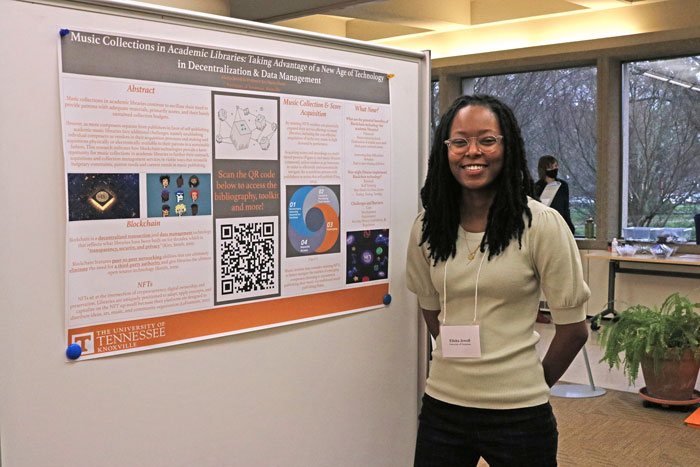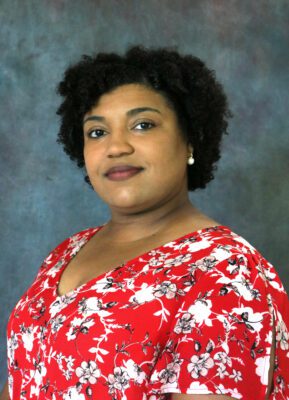Student Elisha Jewell and Assistant Professor of Practice Joy Marie Doan Research How NFTs Can Benefit Libraries

MSIS student Elisha Jewell with her research poster on NFTs and libraries, at the 2022 CCI Research Symposium.
Libraries are often places of innovation, many times embodying the adage, “Necessity is the mother of invention.” Sitting at the crossroads of technology and information access gives information sciences professionals a unique view of the world, and in the case of School of Information Sciences master’s student Elisha Jewell, a unique take on the blockchain and non-fungible tokens (NFTs).
“What my research is really aiming to do is to provide fundamental knowledge to library and information professionals about blockchain technology and NFTs. We want to shed a light on how this technology can provide an opportunity for music collections in academic libraries to further outreach, assist with acquisitions and collection management services, and help libraries keep up with current trends in technology and music publishing,” Jewell said.
Her interest in this was piqued after scrolling through Twitter and seeing a variety of cartoon apes and pixelated characters on her timeline and learning they were trending NFTs called Bored Apes and Crypto Punks. While she was already familiar with the blockchain due to her own cryptocurrency investments, this was new. She dug in and began imagining the possibilities.
Jewell explains NFTs as a “one-of-kind interchangeable digital asset that can be bought and sold on various NFT marketplaces and allow digital ownership to stay with the creator.” There will always be a trail of who owned the NFT, as it is recorded on the blockchain.

Assistant Professor of Practice Joy Marie Doan
But how does that translate to tech that libraries can take advantage of? As a musician herself with an interest in music librarianship, Jewell gravitated toward how both libraries and composers could benefit from this tech. She reached out to Assistant Professor of Practice Joy Marie Doan, who has experience as a past music library director, to dig deeper into this idea.
Doan explained that music libraries have long operated by purchasing musical compositions through vendors who work with publishers. Composers choose whether to work with publishers. Working with a publisher, and by proxy a vendor, may heighten the likelihood that a composer’s work are held in a library. With the technology availed to composers today, they can easily publish their own work—but not so easily work with the vendors who sell to libraries.
“In some libraries it’s okay to buy directly from self-published composers. However, in some libraries, depending on their budget and their collection development plan, you can’t do that, because you’re not going through an approved vendor or publisher,” Doan said.
NFTs could circumvent this process, which would allow composers who are historically marginalized and overlooked to more easily sell their music to libraries, and for libraries to acquire a more diverse collection. As the current system stands, it’s typically less expensive to purchase through vendor plans because vendors will bundle various compositions together as part of approval plans, versus a one-off singular purchase.
“This project primarily speaks to music academic libraries. These collections are typically connected to a conservatory or a school music, in which the music library isn’t just collecting standard repertoire, but looking to acquire new compositions. There’s a definite acquisition need for what’s new that’s being composed outside of a traditional western canon,” Doan said.
Jewell said NFT Twitter is filled with independent artists who are already taking advantage of NFTs to sell their works in this way, and while it is new, it is likely to continue growing as a market.
“There will be hurdles for libraries to start embracing this practical application of the blockchain in their processes, including re-educating those who have read about fraudulent experiences within blockchain and NFTs. We want to highlight the features that technology has to offer and present ways in which this technology can have a greater impact in the Information Sciences profession,” Jewell said.
Doan noted that purchasing and budgeting models will have to be tweaked if libraries want to do this, and many people may have concerns about the sustainability of the technology.
While her current research is preliminary, Jewell said she wants to continue working within this area of research even after she graduates this May to discover more ways blockchain tech could and will impact libraries. Doan said she’s been impressed with Jewell’s research direction, as Doan had little knowledge of NFTs when she and Jewell began research.
“This is a student-led research project, my expertise for this study primarily rest in acquisitions and collection development in music libraries, particularly in academic libraries. I was familiar with blockchain. However, when Elisha came to me with this research, I found it really interesting,” she said. “It’s been fascinating to learn how this could fit into a model of acquisitions and be utilized to revolutionize and diversify collections, which is something I have worked on in the past.”